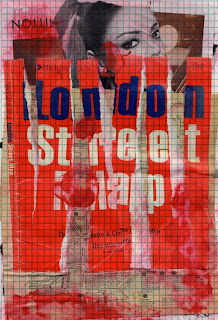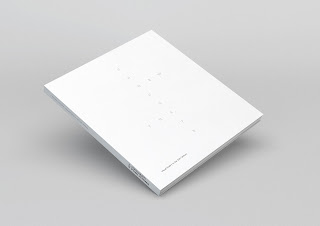london bacteria is virulent : writing whitehall jackals
I’d first met Jeremy in the Summer, I think, of 2008. I mean it was definitely the Summer though the year might be wrong. At that time Red Snapper books existed on Cecil Court, so it was before the avarice of the property-classes had driven out the majority of the last swathe of independent bookshops from the city. There are still a few left in the fight but many, like Red Snapper, went under. In Whitehall Jackals, a collaborative book between Jeremy Reed and myself, Jeremy writes about the literal undergroundness of the space beneath the bookshop where many of the rare books and counter-culture magazines were stored.
I remember spending a whole afternoon down there, riffling through rare New York presses such as Angel Hair and Siamese Banana – very limited xeroxed editions of O’Hara and Creeley, often with Joe Brainard covers – as the footfall of the hundreds passed over my head, visible through the smeared glass cubes between the ceiling of the room and the street. Jeremy gave me a copy of his just-published Orange Sunshine: poetry was the only light down there, in a district of London that is slowly condensing into mercantile darkness.
The Soho river
under the floor, a subterranean ooze
deregulated by sharp snappy rains
into a cloudy membrane coating stock,
a low-light lamp on all day, a laptop
pulling books off the net: we worked that way.
(from ‘Red Snapper’ by Jeremy Reed)
Shortly after Red Snapper went under I wrote a piece for Tom Chivers’s Hand + Star about visiting Jeremy in a warehouse in Shoreditch where thousands of pounds of rare editions had been bunkered. When collections of poetry are laid out that way there’s no way of shortcutting where tastes and affiliations lie: there were Faber editions too, but where many readers would have been drawn to talk about the more ordinary Audens, Jeremy and I were drawn to the Americans and the British Poetry Revivalists (those pulling the cord of influence under the Atlantic). Harwood, Raworth, Wieners, Duncan. We spent an hour trying to reconstruct a clear picture of the disappearance of Rosemary Tonks from the fragments we knew. We shared an idol too: the suede-booted Mayakovsky-influenced genius of Barry MacSweeney.
The idea to collaborate formed itself. Jeremy had reviewed my book Zeppelins with enthusiasm and I’d been an admirer of his work ever since reading his poem about Hart Crane. I don’t recall one of us suggesting ‘should we do this’ - the question seemed to always be about when. We made it a New Year’s resolution and by the 17th January 2011 I’d sent Jeremy my first poem ‘Waterloo’. This poem was triggered by finding a ripped and abandoned love letter which I’d found on the floor on the approach under the railway bridge to the Royal Festival Hall. I used the complete fragment of the letter in the poem. The gesture was one of summoning up the materials – the detritus, the written, the spoken – into our sequence. There was always going to be a third collaborator in Whitehall Jackals: London.
Looking back at our emails over this period there was a real drive to cover as much distance as possible before the Apocalypse came. Forty poems in three months. The poems were propelled by chance encounters and unexpected synchronicities. In an email on 20 January 2011 Jeremy opened the door to the third collaborator too:
“…use anything found that turns up, anything accidental. I'm writing a poem on the Fleet River I'll send you next.”
As well as the poems, our emails seem to be written in a shared language that we were developing to describe a close-up, microscopic view of the corners of the city we were summoning: "the brittle nacreous ending with the crab's claw"…."as if alkaline batteries could grow from the ground"… "filmic ending with the courier and the plain girl"…"This City’s sometimes too strange to condense into any order"… "London bacteria is virulent. I love the rich mosaic"…"epicentre of most of London's various rock spearheads now the construction site of a luxury hotel"…"submerged downwards on the underground beach"… "the tide's choleric black spume, the underworld drag, the littering, the found objects".
I would send a poem to Jeremy on a Wednesday, his response would be in my inbox on Thursday. Because we let so much of London into our thinking, I think of the poems as pinning our movements across its grids like tags for some mass observation exercise. The collaboration for me is as much about the documenting of two lives at a specific point in London’s history than it is about ‘poetry’.
Later, I marked on a A-Z maps the exact locations of where we’d written each of the poems, then ripped up the maps, glued them to card, added other media, covered them with emulsion paint and left them outside to be rained upon. These images appear as the endpapers in the book.
Writing Whitehall Jackals was an approach that aimed to push at the write-wait-redraft approach to poetry through an assimilation of London’s speed and unexpectedness. The book, published by Nine Arches, is a document of three lives (two poets and the life of the city of London) between January and April 2011. We always had the idea of taking the book back to London, through a series of readings, a kind of five-compass enactment of its spread and scale. The first of these will be taking place at this weekend's Poetry Book Fair at The Square Pig &Pen, at 7pm. Starting at the centre, at Holborn, not far from where many of the poems where written.
Whitehall Jackals has been reviewed here in Stride and here in Sabotage.
The book is available from Nine Arches press for £9.99 here.
 |
| Whitehall Jackals, 2013 |
The Soho river
under the floor, a subterranean ooze
deregulated by sharp snappy rains
into a cloudy membrane coating stock,
a low-light lamp on all day, a laptop
pulling books off the net: we worked that way.
(from ‘Red Snapper’ by Jeremy Reed)
Shortly after Red Snapper went under I wrote a piece for Tom Chivers’s Hand + Star about visiting Jeremy in a warehouse in Shoreditch where thousands of pounds of rare editions had been bunkered. When collections of poetry are laid out that way there’s no way of shortcutting where tastes and affiliations lie: there were Faber editions too, but where many readers would have been drawn to talk about the more ordinary Audens, Jeremy and I were drawn to the Americans and the British Poetry Revivalists (those pulling the cord of influence under the Atlantic). Harwood, Raworth, Wieners, Duncan. We spent an hour trying to reconstruct a clear picture of the disappearance of Rosemary Tonks from the fragments we knew. We shared an idol too: the suede-booted Mayakovsky-influenced genius of Barry MacSweeney.
The idea to collaborate formed itself. Jeremy had reviewed my book Zeppelins with enthusiasm and I’d been an admirer of his work ever since reading his poem about Hart Crane. I don’t recall one of us suggesting ‘should we do this’ - the question seemed to always be about when. We made it a New Year’s resolution and by the 17th January 2011 I’d sent Jeremy my first poem ‘Waterloo’. This poem was triggered by finding a ripped and abandoned love letter which I’d found on the floor on the approach under the railway bridge to the Royal Festival Hall. I used the complete fragment of the letter in the poem. The gesture was one of summoning up the materials – the detritus, the written, the spoken – into our sequence. There was always going to be a third collaborator in Whitehall Jackals: London.
Looking back at our emails over this period there was a real drive to cover as much distance as possible before the Apocalypse came. Forty poems in three months. The poems were propelled by chance encounters and unexpected synchronicities. In an email on 20 January 2011 Jeremy opened the door to the third collaborator too:
“…use anything found that turns up, anything accidental. I'm writing a poem on the Fleet River I'll send you next.”
As well as the poems, our emails seem to be written in a shared language that we were developing to describe a close-up, microscopic view of the corners of the city we were summoning: "the brittle nacreous ending with the crab's claw"…."as if alkaline batteries could grow from the ground"… "filmic ending with the courier and the plain girl"…"This City’s sometimes too strange to condense into any order"… "London bacteria is virulent. I love the rich mosaic"…"epicentre of most of London's various rock spearheads now the construction site of a luxury hotel"…"submerged downwards on the underground beach"… "the tide's choleric black spume, the underworld drag, the littering, the found objects".
 |
| Endpaper from Whitehall Jackals |
Later, I marked on a A-Z maps the exact locations of where we’d written each of the poems, then ripped up the maps, glued them to card, added other media, covered them with emulsion paint and left them outside to be rained upon. These images appear as the endpapers in the book.
Writing Whitehall Jackals was an approach that aimed to push at the write-wait-redraft approach to poetry through an assimilation of London’s speed and unexpectedness. The book, published by Nine Arches, is a document of three lives (two poets and the life of the city of London) between January and April 2011. We always had the idea of taking the book back to London, through a series of readings, a kind of five-compass enactment of its spread and scale. The first of these will be taking place at this weekend's Poetry Book Fair at The Square Pig &Pen, at 7pm. Starting at the centre, at Holborn, not far from where many of the poems where written.
Whitehall Jackals has been reviewed here in Stride and here in Sabotage.
The book is available from Nine Arches press for £9.99 here.



Comments
Great work! You catch the synchronicities and accidents that can only be London. The hum of power, there.
I did a write-up of John Stammers' work short while ago, The Happy Moment, and came to the conclusion that London has its own language. As much as Tom Chivers, City State, emphasizes the divisions of London into localities, to the rest of the country it is distinct and identifiably one.